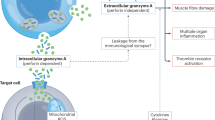Abstract
SEVERAL proteins in normal serum can serve as suppressors or enhancers of the immune response. Recently an α-globulin-rich fraction of Cohn fraction IV, designated IRA (immuneregulatory α-globulin), has been implicated in suppressing the in vitro antibody response of mouse spleen cells to sheep red cells without cytotoxicity1. Studies by Chase2 also indicate that α2-macroglobulin, one of the protease inhibitors present in normal serum, limits the human lymphocyte response to phytohaemagglutinin, and concanavalin A as measured by 3H-thymidine incorporation. A similar role for α1-antitrypsin (α1-AT), the major protease inhibitor in normal serum, can be proposed for involvement in the regulation of the immune response. Proteases have been found on both the surface and in the medium of cultured cells3; they have also been implicated in altering the electrophoretic mobility4, in vivo migration5 and blast transformation6 of lymphocytes. The physiological function of α1-AT in the serum is unknown. It is not clear why there is an increase of this protease inhibitor in certain physiological and pathological conditions7. Results presented here suggest that α1-AT has an immunoregulatory role, by suppressing the in vivo and in vitro immune response of mouse spleen cells against sheep red cells (SRBC).
This is a preview of subscription content, access via your institution
Access options
Subscribe to this journal
Receive 51 print issues and online access
$199.00 per year
only $3.90 per issue
Buy this article
- Purchase on Springer Link
- Instant access to full article PDF
Prices may be subject to local taxes which are calculated during checkout
Similar content being viewed by others
References
Badger, A. M., Merluzzi, V. J., Mannick, J. A. & Cooperband, S. R. Immunology 118, 1228–1231 (1977).
Chase, P. S. Cell. Immun. 5, 544–554 (1972).
Bosmann, H. B. Nature 249, 144–145 (1974).
Bona, C., Anteunis, A., Robineaux, R. & Halpern, B. Clin. exp. Immun. 12, 377–390 (1972).
Berney, S. N. & Gesner, B. M. Immunology 18, 681–691 (1970).
Vischer, T. L. & Bertrand, L. Agents Actions 6, 180–182 (1976).
Koj, A. in Structure and Function of Plasma Proteins (ed. Allison, A. C.) 97–98 (Plenum, London, 1974).
Schmiege, S. K. & Miller, H. C. J. Immun. 113, 110–119 (1974).
Homer, G. M., Ketchman, B. J. & Zipf, R. E. Clin. Chem. 9, 428–437 (1963).
Mancini, M., Carbonara, A. O. & Heremans, J. F. Immunochemistry 2, 235–254 (1965).
Kueppers, F. J. Lab. clin. Med. 88, 151–155 (1976).
Davis, B. J. Ann. N.Y. Acad. Sci. 121, 404–427 (1964).
Mischell, R. I. & Dutton, R. W. J. exp. Med. 126, 423–442 (1967).
Author information
Authors and Affiliations
Rights and permissions
About this article
Cite this article
ARORA, P., MILLER, H. & ARONSON, L. α1-Antitrypsin is an effector of immunological stasis. Nature 274, 589–590 (1978). https://doi.org/10.1038/274589a0
Received:
Accepted:
Issue Date:
DOI: https://doi.org/10.1038/274589a0
This article is cited by
-
Marked alveolar apoptosis/proliferation imbalance in end-stage emphysema
Respiratory Research (2005)
-
Diagnostic significance of α1-antitrysin in primary hepatic carcinoma — An appraisal of monoclonal antibody-rate nephelometry
Chinese Journal of Cancer Research (1990)
-
New human colorectal carcinoma cell lines that secrete proteinase inhibitors in vitro
Virchows Archiv B Cell Pathology Including Molecular Pathology (1989)
-
Serum protease inhibitors in acute viral hepatitis
La Ricerca in Clinica e in Laboratorio (1987)
-
Localization of CEA, HCG, Lysozyme, alpha-1-antitrypsin, and alpha-1-antichymotrypsin in gastric cancer and prognosis
Virchows Archiv A Pathological Anatomy and Histopathology (1986)
Comments
By submitting a comment you agree to abide by our Terms and Community Guidelines. If you find something abusive or that does not comply with our terms or guidelines please flag it as inappropriate.



